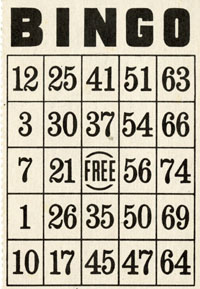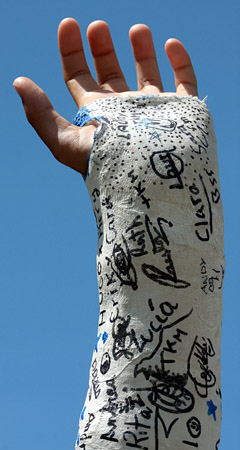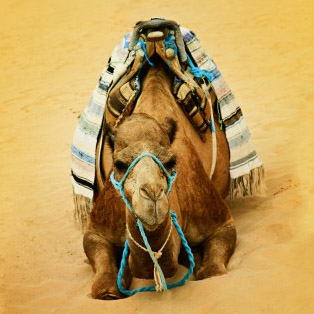
Let’s Go to Disney World!
A few years ago, a friend of mine wanted to take her two young daughters to Disney World, but she didn’t have enough money.
Her and her husband’s combined salaries weren’t nearly enough to cover the airfare, hotel, park admission, and other travel expenses–but they really wanted to give their daughters a memory of a lifetime, especially while they were still young enough to really experience the magic.
So, whereas many people might have given up, they decided to brainstorm. (As Robert Kiosaki might say, they shifted from “We CAN’T afford this” to “HOW can we afford this?”) And here’s what they came up with:
 BINGO!
BINGO!
Yes, literally–bingo! They decided to hold a bingo fundraiser.
And they did it right: They bought a lot of great prizes (to give to the winners), publicized the event, and rented out a nice venue.
The event was a huge success: The place was packed, everybody had a great time, and they raised enough to take the vacation–which they all loved (especially the girls)!
It was heartwarming to see–and provided a great lesson about ingenuity, outside-of-the-box problem solving, and being a loving parent…
But that’s not what I came to tell you about.
(…as Arlo Guthrie famously said.)
I wanted to tell you about a funny, eye-opening moment that happened during the bingo game.
As I said, my friend bought lots of great prizes, which enticed people to play more. (Jodi and I even won a set of 12 kitchen knives–complete with a beautiful wooden holder–which we still use every day!)
One of the best prizes was a really nice set of plates, bowls, and silverware. The person who won was so excited, but when he came up to claim this great prize, my friend was apologetic, saying, “I’m so sorry–it was supposed to come with a set of dish towels, but the store was out of the towels.”
Jodi and I looked at each other with smiles that clearly showed that we were thinking the same thing: “WHY would she say that? She has absolutely nothing to apologize for!”
After all, this was a GREAT prize, which the person had won by spending a whopping $1 on a game of bingo! And the winner had NO IDEA that the set was missing anything. He wouldn’t have expected (or even known about) the “missing” towels if my friend hadn’t mentioned them.
Lessons of the “Missing” Towels
This seemed like a small, innocuously funny moment at the time; but over the years, “the missing towels” has become our short-hand phrase for situations like this (which come up more often than you might think!).
It’s also served to remind us of three important lessons:
1. Focus on what IS, rather than on what ISN’T
When I was a young kid, my father used to sing a song with the words, “As you go through life make this your goal: watch the doughnut, not the hole.”
It’s true in so many contexts. We can get so fixated on what we DON’T have that we forget to appreciate what we DO have. Not only will this appreciation make us happier NOW, but it will also help us get more of what we love, appreciate, and focus on–while making those gaps, holes, or “missing towels” seem less and less important.
2. Everything’s relative.
In my friend’s mind, the winner was getting deprived of towels. In the winner’s mind (and mine!), he was getting a great prize!
It’s like giving someone $10 and saying, “Sorry, I was going to give you $20, but this is all I have right now.” The recipient might feel slightly bad or even deprived–despite getting $10! On the other hand, if you gave someone $10 and said, “I was going to give you $5, but I realized I had $10,” the recipient would probably feel twice as good!
You can make someone (including yourself!) feel better or worse about the same event, simply by reframing or changing the context.
3. No Need to Apologize (…when there’s no need for apologies)
I’m a big advocate of apologizing…when apologies are in order. (One of my personal mottos is “When you mess up, ‘fess up!”) A sincere apology can go a LONG way toward mending hurt feelings.
However, when you’ve done nothing wrong–or, in fact, have done something very RIGHT (such as given someone a nice gift or prize)–there’s no need to apologize. Rather than improve a relationship, an unnecessary apology can actually make the person you’re apologizing to feel worse–feeling bad that you feel bad enough to apologize.
(Unnecessary apologies can also plant a seed of doubt that perhaps you HAVE done something wrong–something that probably would never have dawned on them if you hadn’t brought it up.)
Honesty and Appreciation
Now, let me be clear: I’m not encouraging anyone to be dishonest or withhold information. I’m merely suggesting that, in most cases, no one knows that towels (or anything else) are missing–unless you tell them.
Ultimately, we all want to feel good about our lives. And what do you think will make everyone feel better: appreciating what IS there or bemoaning what ISN’T there? The doughnut or the hole? The nice plates or the missing towels?
If you said appreciating what is there–the doughnut and the plates…
BINGO!
…
If you liked this post, please feel free to comment and/or share this with anyone else you think might enjoy it.
P.S. Last call to sign up for the “Coming Back to Life” ecourse at the discounted rate. Register before 9/1 and save $20.
Join me, Jodi, Kristine Carlson (Don’t Sweat the Small Stuff), Jen Louden (The Woman’s Comfort Book), and dozens of other soulful contributors on this journey of waking up and living fully! Click here for details.



